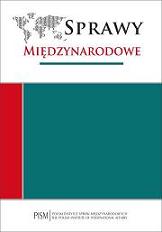Wpływ służb wywiadowczych na kształtowanie polityki zagranicznej państw zachodnich na przykładzie Stanów Zjednoczonych
The Impact of Intelligence Agencies on Shaping Western States’ Foreign Policy. The Example of the United States
Author(s): Hubert ŚwiętekSubject(s): Politics / Political Sciences
Published by: PISM Polski Instytut Spraw Międzynarodowych
Summary/Abstract: Intelligence agencies in democratic countries are perceived as powerful actors who defend freedom, but which also secretly are behind important political events and have in-depth knowledge about them. Politicians commonly believe that intelligence data can be a basis for decision-making. Supervision over intelligence is limited, due to politicians’ lack of professional intelligence-gathering knowledge and the professional image of the agencies. Numerous examples from the history of American intelligence over the last 25 years show that such an image is overestimated. The main reasons for the weakness of American intelligence are: lack of motivation, staffing and incompetence, bureaucratisation, the commoditization of intelligence, technological fanaticism, shortcomings in protection against personal espionage, expansion of the national security sector, and a lack of proper supervision. To improve the situation, politicians should be aware that intelligence cannot be a substitute for policy and its bases. Supervision should be strengthened, and the powers allowed the intelligence agencies limited. Human analysis should be the centre of interest and the importance of technology should not be overestimated.
Journal: Sprawy Międzynarodowe
- Issue Year: 2013
- Issue No: 2
- Page Range: 39-68
- Page Count: 30
- Language: Polish

